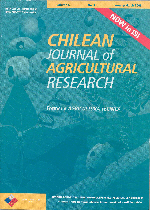
|
Agricultura Técnica
Instituto de Investigaciones Agropecuarias, INIA
ISSN: 0365-2807
EISSN: 0365-2807
Vol. 64, No. 3, 2004, pp. 295-304
|
 Bioline Code: at04032
Bioline Code: at04032
Full paper language: Spanish
Document type: Research Article
Document available free of charge
|
|
|
Agricultura Técnica, Vol. 64, No. 3, 2004, pp. 295-304
| en |
Effect of soil leaching techniques and fertilization on the salinity of soils of the upper Río Negro Valley and Neuquén, Argentine
Gili, Perla S.; Marando, Graciela I.; Irisarri, Jorge E. & Sagardoy, Marcelo R.
Abstract
The objective of this study was to evaluate the effect of soil reclamation by leaching, application of nitrogen fertilizer and inoculation with Sinorhizobium meliloti to reduce saline stress in alfalfa plants (Medicago sativa L.) sown in five soils affected by salts, in the Upper Río Negro Valley and Neuquén, Argentina. Plant responses to salinity were not only related on salt concentration but also on the type of salts present in the soil. The sodium saline type of salinity was the most harmful. In the Typic Torrifluvents (Centenario) soil with high content of NaCl and low content of organic matter, alfalfa seeds did not germinate. Soil reclamation by leaching reduced the electric conductivity from 6.1 to 1.6 dS m-1 and produced changes in the relative concentration of salts, favoring the growth of the plants. The application of nitrates and inoculation with effective strains of S. meliloti allowed improved development of alfalfa plants, and increased dry matter production 16 and 84%, respectively. The technique of soil reclamation by leaching did not produce significant changes in the number of S. meliloti (P< 0.05).
Keywords
salinity, fertilization, Medicago sativa, Sinorhizobium meliloti
|
| |
| es |
Efecto de las técnicas de lavado y fertilización sobre la salinidad en suelos del alto Valle de río Negro y Neuquén, Argentina
Gili, Perla S.; Marando, Graciela I.; Irisarri, Jorge E. & Sagardoy, Marcelo R.
Resumen
El objetivo de este trabajo fue evaluar el efecto de la rehabilitación de suelos por lavado, la aplicación de fertilizante nitrogenado y la inoculación con Sinorhizobium meliloti, para atenuar el estrés salino existente en plantas de alfalfa (Medicago sativa L.), sembradas en cinco suelos afectados por sales, pertenecientes al Alto Valle de Río Negro y Neuquén, Argentina. La respuesta de las plantas a las condiciones de salinidad, no sólo depende de la concentración de sales sino también del tipo de sales presentes en el suelo. El tipo de salinidad sódica es la más perjudicial. En los Torrifluventes Típicos (Centenario) con alto contenido de sales de NaCl y bajo tenor de materia orgánica, las semillas de alfalfa no germinaron. El lavado de estos suelos disminuyó la conductividad eléctrica desde 6,1 a 1,6 dS m-1, y produjo cambios en la concentración relativa de las sales, favoreciendo el crecimiento de las plantas. La aplicación de nitrato y la inoculación con cepas efectivas de S. meliloti permitió un mejor desarrollo de las plantas de alfalfa, y aumentó la producción de materia seca 16 y 84%, respectivamente. La técnica de rehabilitación de suelo no produjo cambios significativos en el número de S. meliloti (P < 0,05).
Palabras-clave
salinidad, fertilización, Medicago sativa, Sinorhizobium meliloti.
|
| |
© Copyright 2004 - Instituto de Investigaciones Agropecuarias, INIA (Chile).
Alternative site location: http://www.inia.cl/at/agritec.htm
|
|
